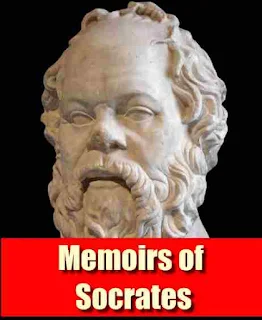Memoirs of Socrates for English readers
 |
| Memoirs of Socrates translated by Edward Levien |
Have often wondered by what arguments the accusers of Socrates could possibly have succeeded in convincing the Athenians that he deserved death at the hands of the state, for the indictment against him ran somewhat thus:— "Socrates violates the laws, inasmuch as he acknowledges not as gods those whom the state acknowledges, but has introduced other and new divinities. He also violates the laws by corrupting the youth." Now as to the first count, that "he did not acknowledge as gods those whom the state acknowledges," what kind of evidence did they adduce?
For he was frequently seen sacrificing without concealment, both at his own house and on the public altars of the city; and lie openly used divination, for it was commonly bruited about how that " Socrates affirmed that the divinity forewarned him." And on this assertion, it was that they seem to be chiefly to have founded the charge of his " introducing new divinities." But in reality, he introduced nothing more novel than others do who employs divination and have faith in birds, and voices, and signs, and sacrifices; ^or such do not suppose that the birds or the people who encounter them know what is best for those who seek their counsel, but only that the gods signify thus much by the instrumentality of such things; and this was also his opinion. Whereas however, most people profess that they are diverted from an object, or incited to it, both by birds and by the people they meet, Socrates asserted that which he himself felt; for he declared that it was the divinity who was his forewarned.
Accordingly, he encouraged many of his disciples to some actions, and dissuaded them from others; those who followed his advice were benefited, while those who did not, repented of not having done so. Yet is there anyone who would not admit that he disliked being regarded either as a fool or a braggart by his friends? both of which Socrates certainly would have been considered, if, after affirming that revelations had been vouchsafed to him by a god, he had then proved a deceiver. It is manifest, therefore, that unless he had believed his predictions true, he would not have uttered them.
Who, however, in such matters, would trust in anyone rather than in a god] And if Socrates trusted in the gods, how could he think that there were no gods ] Moreover, he acted on similar principles where his friends were concerned, for he counselled them, in matters in which results follow as of necessity, to proceed in such a way as he thought most conducive to their interests; while in those of which the issue was uncertain, he referred them to divination to determine whether they should act or not.
He said, too, that those who would found families or cities on a sure footing stood in need of divination; for architecture, or metallurgy, or husbandry, or the governing of men, or the power of criticising or reasoning upon such subjects, all these he regarded as matters of science, and as fit - objects for man's selection according to his individual judgment. But the gods, he affirmed, reserved to themselves that which was most important in all such matters, of which nothing was revealed to mortals.
Thus, he who had cropped his land abundantly was by no means sure who should reap the fruits, neither was he who had built a fine house certain who should inhabit it. Nor, again, was it clear to the accomplished general whether it would be to his advantage to undertake the command of the army; or to the politician whether he had better become prime minister; or to him who had married a beautiful woman in the hope of happiness whether she might not prove a bane to him; or to him who had powerful political connections whether by their means he might not be sent into banishment. And he asserted that those who were of opinion that the divinity took no cognisance of such issues, but that they were all matters demanding merely human judgment, must be out of their minds.
Those also he declared to be bereft of their senses who had recourse to divination with a view to solving questions upon which the gods had given the power to men to decide for themselves. For instance, as if anyone should inquire whether it was better to engage as a charioteer a man who could drive, or one who could not; or as a pilot a man who could steer, or a man who could not; or in matters which can be esti- mated by arithmetic, or mensuration, or ponderation.
Those who consulted the gods upon questions of this kind he deemed guilty of impiety, and said that what- ever the gods had given a man the power of informing himself upon, that he should learn; but in matters which were inscrutable to him the gods should be inquired of through divination, for that they vouchsafed revelations to those whom they regarded favourably.
Moreover, with regard to his own conduct, he always acted without any attempt at concealment, since he was wont early in the morning to attend the public promenades and the gymnasia, and was constantly to be seen in the Forum at the time of high market; while for the rest of the day he went where he was likely to meet the most people, and discoursed as much as possible/
Download 9.8 MB

